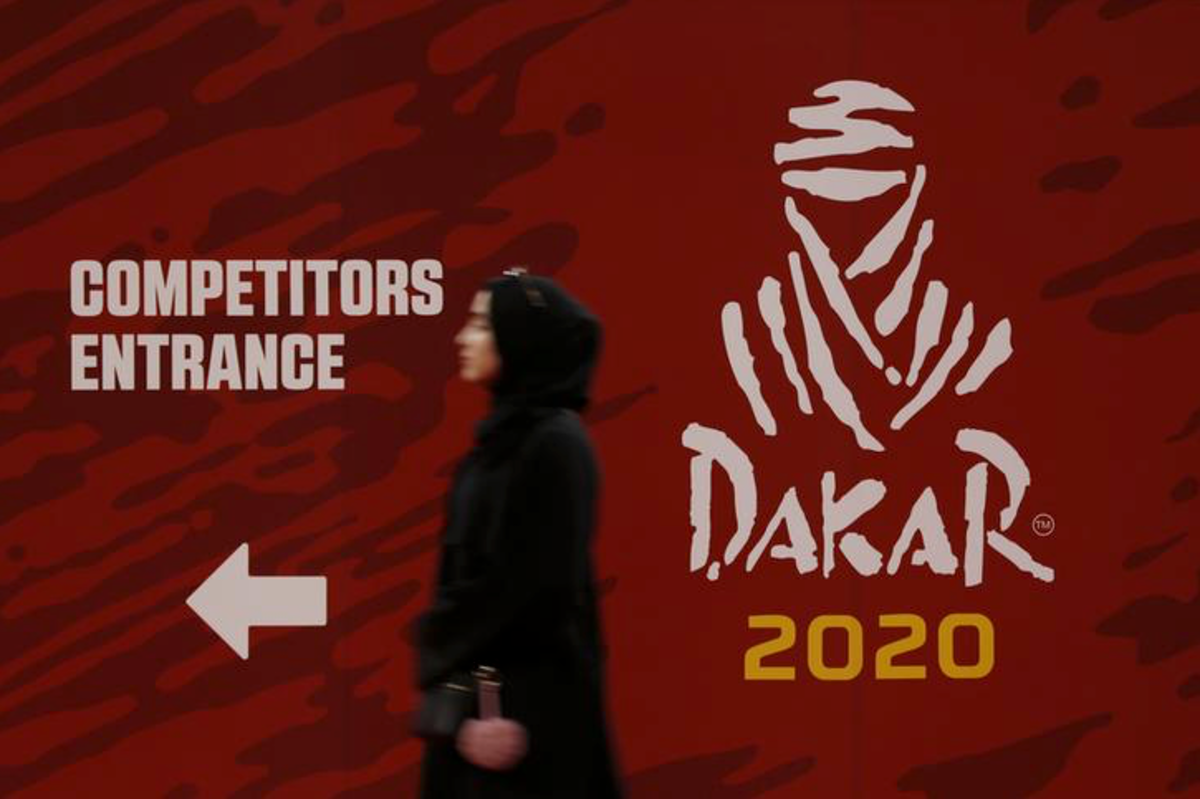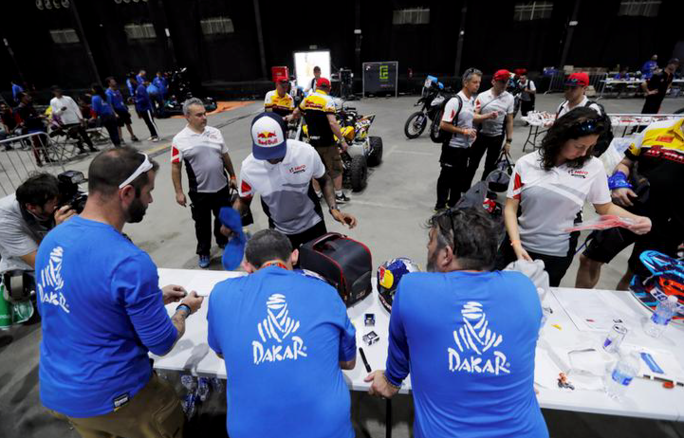The 557 competitors who began the 42nd Paris-Dakar Rally in Jeddah on Sunday January 5th probably think that they are taking part in a sporting competition. They probably believe that over the following 12 days, the event is all about them testing their ability to navigate the desert, mastering how to drive in the sand and overcoming their resistance to extreme fatigue. But they are mistaken.
They are, in reality, bit players in an enormous political public relations exercise aimed at making the world forget the October 2018 assassination in appalling circumstances of journalist Jamal Khashoggi, who had criticised the authoritarianism and corruption of the princes who hold power in the kingdom. It was a swift and savage murder which said a great deal about the true violent and hypocritical nature of the Saudi regime.
By buying, at huge cost, the massive global media hype that goes along with the rally, Saudi's Crown Prince Mohammed Bin Salman, who is the real ruler rather than his father King Salman, is seeking to hide the true face of his country from the world. In a similar way 'MBS', as he is often referred to, also tries to pass off his marginal changes to Saudi despotism as modernist reforms or even “democracy”.
But the reality of his country is there for all to see. The Wahhabi kingdom remains an heredity monarchy with medieval traditions, governed by Sharia law, where freedom of expression, gathering and association do not exist. It is a place where the promotion of democracy is a crime punishable by the death penalty, as is all criticism of the regime, adultery, homosexuality and changing one's religion.

Enlargement : Illustration 1

The country where the 42nd Paris-Dakar Rally is taking place is a land where death sentences are common and executions no less so. In 2019 there were 180 executions in Saudi Arabia, whether through decapitation by sword, crucifixion or being stoned to death. That means that on average an execution took place just about every two days. This is a land where there is a genuine sexual apartheid meaning that women in effect remain minors their whole life, subject by law to the legal guardianship of men. This status means they have to get permission from a male guardian to work, travel, study, marry or get health care.
In this land of the “deep and mysterious deserts” - as race organisers Amaury Sports Organisation (ASO) put in in their description of the rally's host country – defenders of human rights such as journalists, activists, political opponents and writers are treated as enemies of the state and subjected to enforced disappearances and arbitrary detention. They are victims of a specific legal armoury, in particular “antiterrorism” laws which criminalise a large range of peaceful civic activities. Thousands of democracy and human rights activists have been detained, receiving sentences from six to 30 years in prison.
Between May and July 2018, for example, several feminist activists involved in the defence of human rights and in particular the campaign in favour of women's rights, were arrested and thrown into prison. Here they have been subjected to torture and degrading violence. Among these activists was Loujain al-Hathloul, a student in social sciences at the Sorbonne University Abu Dhabi and whom Mediapart met in July 2017.
“You have to understand that we're facing a double challenge,” she told us at the time. “Saudi women are subject to the same human rights violations as the men – lack of freedom of expression, of association, of demonstrating – but on top of that they must endure the unacceptable discrimination and violence imposed by men. For on top of the physical violence that they have to endure, which goes completely unpunished, there is emotional abuse, a lack of financial independence, the deliberate withholding of education.”
Loujain al-Hathloul continued: “But our struggle must also go beyond the cause of women. That's why we support the demand for the amendment – while waiting for something better – of two major anti-freedom laws: the law on cyber-criminality and the antiterrorist law. These laws contain many vague articles which are often invoked to prosecute and convict human rights defenders by accusing them of harming state security or relations with foreign organisations.”
Saudi Arabia is home to one of the most backward, intolerant and fundamental versions of Islam, with a predatory authoritarian government infused with the sense of impunity that massive oil reserves bring. So is this country really the haven of peace and prosperity sought by the rally's organisers?
The original Paris-Dakar event went from France through Africa between the years 1979 and 2007 but was cancelled in 2008 because of security threats identified in the south Sahara. Until last year it had instead taken place in Latin America, when the economic crisis in that region persuaded the organisers to find another, less underprivileged, desert.
The Saudi regime, of course, has no shortage of money. And its financial offers clearly convinced a sports event company that is more motivated by the prospect of financial profit than by the ethics of the competition and human rights concerns.

Enlargement : Illustration 2

Even the security of the race, which was so crucial 12 years ago in the Sahel region of Africa, seems to have become secondary in the Arabian Peninsula. For Saudi Arabia is anything but a country in peace. Its ambitions of regional supremacy, in competition with Iran, have helped create a climate of 'lukewarm war' between the two countries. The most spectacular demonstration of this came on September 14th 2019 with the devastating attack on two Saudi oil processing facilities by Iranian missiles and drones.
As the Wahhabi kingdom is, alongside Israel, one of the United States' major allies in the region it also now risks being the target of the Iranian reprisals which seem inevitable after the killing of General Qasem Soleimani, Iran's proconsul in Iraq and Syria, by an American raid on Friday January 3rd 2019.
On January 13th, four days before it ends, the rally will also travel along a section of the course that runs to the south of the town of Wadi Al Dawasir, which is around one hundred kilometres from the border with Yemen. The Saudi army has been involved in a war in Yemen since 2015 which according to the United Nations has already claimed 100,000 lives – 12,000 of them civilians – and has left three million people displaced. The rally will thus be within the range of missile strikes by rebels, supported by Iran, who are fighting Saudi Arabia.
The silence of the organisers and French public broadcaster France Télévisions
Given these circumstances, the question arises as to why the rally organisers ASO decided to go along with the Saudi strategy of trying to conceal its terrible human rights record. Especially as this could cause lasting damage to its image and even risk putting its staff and competitors in danger. The answer is that the Saudis made an offer they could not refuse.
In a joint statement on January 3rd, human rights activists from groups such as the International Federation for Human Rights(FIDH) the Ligue des droits de l’Homme (LDH) and the Gulf Center for Human Rights said: “In recent years, Saudi Arabia has embarked on a major campaign to purchase and finance cultural and sporting events. Since the murder of journalist and dissident Jamal Khashoggi, the Kingdom has flooded the sports world with its dollars, similar to the model of the United Arab Emirates and Qatar, organisers of the 2022 Football World Cup.”
The same document from the FIDH and the LDH states that the contract is believed to be worth up to 80 million euros over five years.
“Our country is passionate about sport,” insisted Abdulaziz bin Turki Al Saud, the country's sports minister. “And our strategic objective is to feed this appetite as we move towards the realisation of our Vision 2030 [editor's note a plan to develop and modernise the country], of which sport is one of the cornerstones.”
To meet this Saudi thirst for sport the kingdom, advised by several French communications agencies such as Publicis, Havas and Image 7, has, since the murder of Jamal Khashoggi, bought the rights to a number of sporting events. These include a Formula E grand prix – for electric cars – NBA basketball matches and baseball matches, a rematch of the world heavyweight boxing contest between Andy Ruiz Jr and Anthony Joshua (won by Joshua), the Italian Super Cup (in which Lazio beat Juventus 3-1) and the Dakar Rally, with other events in the pipeline. All have been broadcast globally.
Closely following the strategy defined by its Parisian advisors, Riyadh has also launched a vast 'cultural' offensive in France. It has done so via numerous financial and partnership deals, with the Opéra de Paris, the Cannes film festival, the Palais de Tokyo art gallery, the National Audiovisual Institute or INA, the film and TV school La Fémis and the Arab World Institute (IMA). The press conference to give details of the Paris-Dakar rally in Saudi Arabia was held at the IMA.
In a bid to remind the ASO group of Saudi's whitewashing attempts and the fact that the rally organisers were thus paid accomplices of this, in April 2019 and then again on December 23rd 2019, the FIDH, the LDH and their partner organisations in Saudi Arabia wrote to the group's president, Jean-Étienne Amaury, and its directer general, Yann Le Moenner. The letters reminded them of their responsibility over promoting a country that is “notoriously far-removed from international principles on human rights”. The letters were in vain.
The FIDH also wrote in both April 2019 and on December 13th 2019 to Delphine Ernotte, president of public broadcaster France Télévisions, the rally's official broadcaster, to ask her to “revoke its partnership” or at least to “make sure that the broadcast of the Dakar [rally] is not just a free platform for the Saudi regime to restore its image and make people forget its crimes”. Again, the letters had no effect.
One problem is that a bad example has been set at the very highest level of state. President Emmanuel Macron has the habit of sparing tyrants and dictators when they are good customers of our arms industry. It took the French president almost two months after the murder of Jamal Khashoggi to show disapproval by banning 18 Saudi nationals from French soil, following on from similar moves by Washington, London and Berlin. And he described the decision of German Chancellor Angela Merkel to announce an embargo on deliveries of German arms to Saudi Arabia as “pure demagoguery”.
It is fair to say that such an initiative was far from the president's thoughts and remains a long way from his plans. For Riyadh is France's third largest customer when it comes to arms sales, which is something the Elysée and the French Ministry of Foreign Affairs both value. On December 23rd 2019, the very day that the Saudi Arabian prosecutor announced the alarming verdicts in the trial of those accused of Jamal Khashoggi - a trial described as a “parody” by the UN expert who had investigated the affair - France delivered three warships to Riyadh.
Given that the French head of state and France's foreign minister, Jean-Yves Le Drian, lead the way in refusing to see the despotic and bloody reality of a regime because it buys French weaponry, should one be surprised that the organisers, broadcasters and competitors of the Saudi Dakar Rally should also be blind to the same sinister reality?
---------------------------------------------------------------------------------
- The French version of this op-ed can be found here.
English version by Michael Streeter


